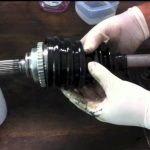
The cooling system makes use of coolant also known as antifreeze to cool the engine and lubricate other moving parts in the engine, parts such as the cylinder, gasket head, etc. They are usually a mixture of water (distilled water) and ethylene glycol while some are made up of propylene glycol.
A common problem with the coolant is its tendency to boil beyond boiling point, this can be due to a number of reasons. So, why is my coolant boiling after car my car is turned off?
The reasons why coolant is boiling after the car is turned off is because of overheating caused by insufficient water to cool down the engine, increased air pressure in the cooling system as well as the liquid flow that is blocked in the cooling system.
What is a Boiling Coolant?
A Boiling coolant is not an uncommon problem in vehicles, it is when the coolant builds up pressure to a level in an enclosed space without a way of letting it out.
Boiling is usually an indicator that something is blocking the flow of coolant/liquid. There are lots of reasons why pressure will build in the cooling system beyond the boiling point.
The cooling system is designed in a way that prevents air from entering, if air manages to get inside, it will cause air pockets to form. Air pockets reduce or stop the flow of coolant resulting in overheating and boiling.
Overheating of the engine or in the cooling system is usually a recipe for the coolant to boil (although not all the time), irrespective of the cause of the overheating.
The quality of the coolant and pressure in the cooling system will largely determine the point at which it will boil, the coolant can boil while the engine is running and after the car has been turned off, this may happen due to different reasons.
Why is My Coolant Boiling After Car Turned Off?
The major reason why the coolant boils after turning the car off is because of insufficient water to cool down the engine. It also means that the air pressure in the cooling system has increased too much, or the liquid flow in the cooling system is blocked.
A car engine needs a mixture of coolant and water or only coolant depending on the type in order to cool off well, not ordinary water (tap water) though.
Often time people use only water as a replacement when coolant isn’t available for use, this isn’t a good idea because it is very bad for the engine.
When there’s not enough water, the coolant passes the boiling point of the water even under pressure. It is always best to use a 50/50 coolant mixed with distilled water or just a 50/50 coolant.
Insufficient water could be a result of a bad water pump, if this is the case, you will need to get a replacement in order to avoid future occurrences.
Another reason for a boiling coolant could be low coolant, in this case, you’ll need to find out why as it could be due to leakage.
You can tell if it is caused by a leakage by looking underneath the car when it is parked, a wet patch will be left underneath if this is the case. And If the reduction is not due to leakage, you will have to continuously top up the coolant.
Solutions to Boiling Coolant after Car is Turned Off
Boiling coolant is most times a source of concern for some people, they are usually confused about what to do to stop it. Not to worry, you can have it solved in some easy steps
Since the boiling was caused by air trapped inside the cooling system, we will have to get rid of it by doing the following;
- Unscrew the coolant cap (not fully) then turn on the ignition
- Let the car run for some time in order to give the fan ample time to come on
- Then wait for the car to warm up or you can turn up the aircon to its hottest
- After that, take a close look at the coolant reservoir. You will notice bubbles coming inside, at this point the antifreeze starts its work
- Just as antifreeze is poured in, water should be poured in the same vein. The coolant may need to be refilled as it’s level drops when it replaces trapped air.
- Water is really important to the cooling down of the car.
Tips on How to Avoid Boiling Coolant
Although having a car coolant boil is a common issue, there are tips and steps you can take to prevent or avoid future occurrences.
It is clear that the major cause of boiling coolant is overheating and air pockets that lead to the blockage of fluids. Air is able to enter the cooling system because of a blown gasket head, a crack in the engine block, or a faulty coolant cap.
Since we know the probable ways from which air can enter the cooling system, we’ve taken the first step in the right direction in avoiding boiling coolant.
Checking all of these engine parts at regular intervals will help you know if any of them is faulty and you’re able to take steps in fixing them.
Also, ensure to keep a close watch on the temperature gauge on your car’s dashboard. The temperature gauge tells you when there is a rise in engine temperature, this way you are able to know that your car is on its way to overheating.
Be sure to check your coolant reservoir and top up as often as possible. In all, proper car maintenance is a key factor in avoiding a boiling coolant, doing this at intervals helps you too quickly detect if something is wrong with the car.
Conclusion
It is important to know that the coolant can boil beyond the boiling point without overheating being the root cause i.e. it can be due to other problems in the cooling system or engine.
A proper mixture of water and coolant should be used at all times when filling up the coolant reservoir. Rather than mixing it yourself, you can purchase a pre-mixed coolant to be on the safe side.
Whatever the cause may be, boiling coolant isn’t a good thing in the car and should be fixed quickly. You may have to deal with a boiling coolant both when the engine is running and when it is off, therefore it is important to know how to fix this problem when it arises.









